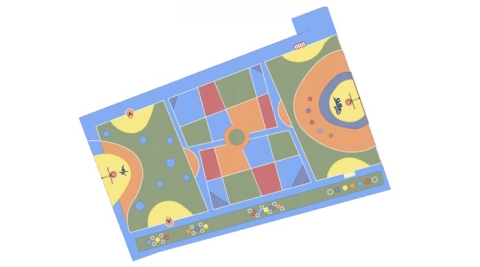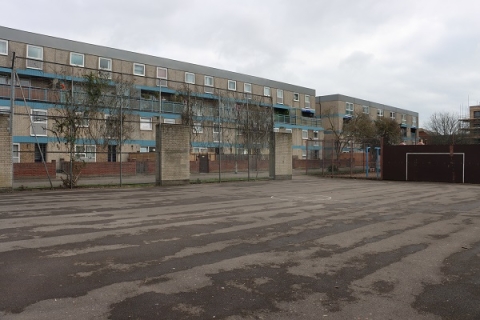Construction has begun on the UK's first PLAYCE, a multi-skills activity space built in Portsmouth using a pioneering scientific model for movement.
The purpose of the outdoor space is to get people moving by challenging them to think outside the box when it comes to physical activity.
It is designed in a way that anyone can use the space, from young and old and with all skill levels, including those with disabilities and additional needs. Uniquely, there will also be no separate areas for different groups, but an integrated "PLAYCE" for all.
The project is a collaboration between the University of Portsmouth, Portsmouth City Council (PCC), and the Athletic Skills Model (ASM) Company, and is being led by Dr Martina Navarro and Dr Chad Witcher.
Dr Martina Navarro, Senior lecturer in the School of Sport, Health and Exercise Science at the University of Portsmouth, said: "After a year of planning and speaking with residents about what they would like to see within the space, we're excited to officially get the ball rolling so to speak.
"The public's input has been incredibly valuable. Requests from residents included demolishing the current brick wall to open up the space, as well as create specific areas for different activities and sports including netball posts, racket ball games and graphics patterns for agility exercises and assault courses."
The versatile public space will be constructed in Lords Court, Landport, after the council approved the use of the site. It will officially open to the public later this summer.

Final Design of PLAYCE Pompey
It is being funded by the University of Portsmouth and supported by external organisations, including Portsmouth City Council, the NIHR and South Western Railway Customer and Communities Improvement Fund (CCIF), which donated £76,000 to the project last year.
The money has been spent on community consultations and engagement, and the design and construction. The council is undertaking the build on behalf of the University, working with Sorcha Sports and Purkiss Builders.
Peter Williams, South Western Railway's Customer and Commercial Director said: "South Western Railway's Customer and Community Improvement Fund is our commitment to funding projects that make a tangible difference to local communities across our network.
"We're absolutely delighted to have been able to play a part in the building of Britain's first PLAYCE and to help provide a new and innovative way for residents of all ages to be active in a specially designed space.
"We're very much looking forward to seeing the finished project when it opens and hearing how it has enriched the life of the local community."
Additional funding from the council's public health team has also trained a number of local community representatives and exercise professionals in ASM theory and principles, so they can optimise both the use of the PLAYCE and apply the knowledge within their own setting. Funding was also secured to improve the area surrounding the site, through greening it, making it more visually appealing and climate friendly.
Future plans for the PLAYCE could include school, sports clubs, health centres, sports coaches and informal carers using it to carry out their training or exercise programmes.
Cllr Darren Sanders, Cabinet Member for Housing and Preventing Homelessness, said: "It's great to see the UK's first PLAYCE taking shape after careful consultation with the people who will use it. It is an exciting opportunity to provide a new and innovative space for residents to be active, whatever their age.
"The design has been informed by residents working alongside the University and they have created a space that means people will be able to exercise in a completely new way, in groups and as families, supported by local people who will be trained by the council.
"This space complements the adventure playground across the road and strengthens the city's portfolio of fun, free spaces for families to enjoy together."

Lords Court, Landport, Portsmouth
The space will be designed in accordance with the principles of the Athletic Skills Model (ASM), a practical and scientifically based talent development model for sport, physical education, health care,art and culture.
Science is involved in the layout, so that basic forms of movement, including balancing, climbing, throwing, frolicking, jumping, etc., can be done. These are known as the ASM's fundamental 10.
The idea originated in the Netherlands, where more than 50 PLAYCEs and Skill Gardens have been built in schools, hospitals, sport clubs, and public spaces.
René Wormhoudt, High-Performance Coach of the Dutch Men's and Women's National Football team, is the CEO and co-founder of ASM.
He explained where the idea for the ASM model came from: "I saw that they were good footballers, but not athletes. As if they could play a beautiful piece on the piano, but they were not musicians.
"Focusing on just one sport or specialism only increases the risk of injuries, overloading and loss of strength. It can also lead athletes and novices to lose interest in what they're doing. For a healthy and high-quality development, it's important to have variety in sport and exercise.
"This results in better performance, fewer injuries, increased creativity and more fun!"
Both the physical health, and mental wellbeing benefits of being active cannot be overlooked, given physical inactivity is associated with 1 in 6 deaths in the UK.
Portsmouth is one of the first universities to develop a Civic Partnership Agreement with partners in the local community and region to promote inclusion and enrich economic, social and cultural life. Its goal is for education and research knowledge and skills to benefit the Portsmouth Harbour region and surrounding areas.
Professor Anne Murphy, Deputy Vice-Chancellor (Education) said: "The PLAYCE Pompey is a great example of how the University encourages collaboration within our region with organisations and residents, to help the area flourish. We are actively contributing to the economic, social, and cultural vitality of our community, to ensure we are a University for Portsmouth."






